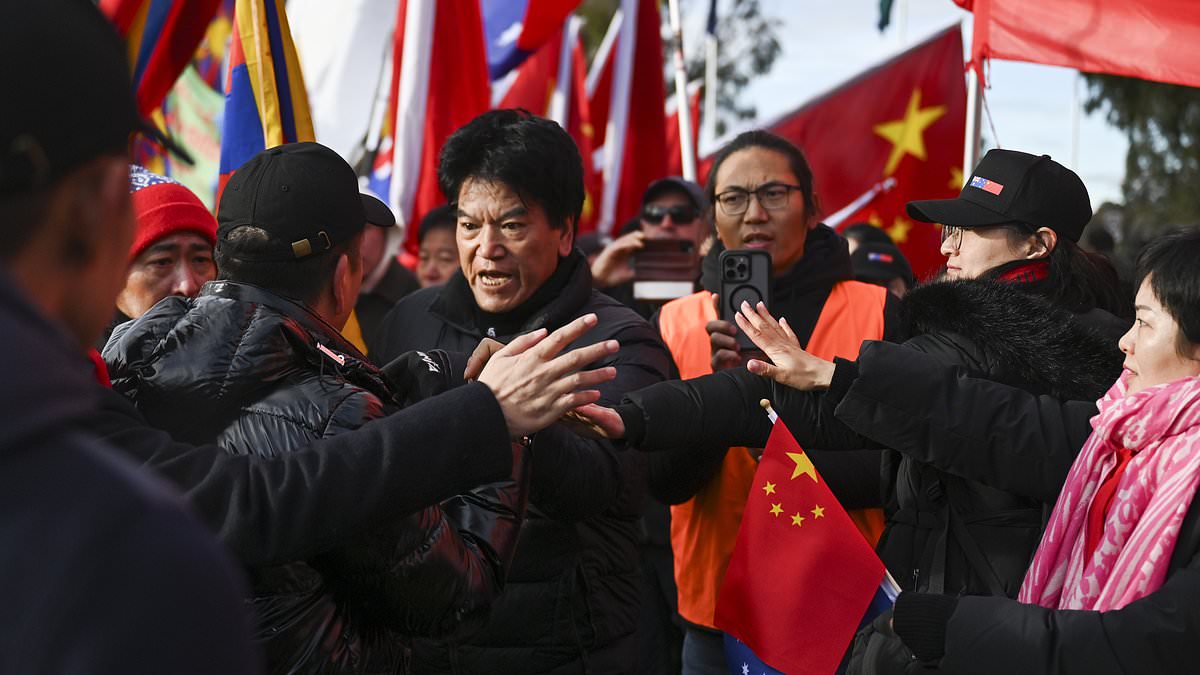Pro-China protesters have swarmed the lawn at Parliament House, blocking out peaceful Tibetan activists as Anthony Albanese prepares to meet China’s second most powerful leader.
Tensions between rival demonstrators escalated on Monday morning ahead of the state visit of Premier Li Qiang in Canberra.
Peaceful supporters of Tibet, a predominantly Buddhist region in China’s far west, were swarmed by counter-protesters who unfurled huge Chinese and n flags to block them from sight.
Some protesters carried huge flags that conjoined the Chinese and n flag, as Tibetan sympathisers struggled to hold their banner aloft.
At one stage, a scuffle broke out as a man fell to the floor and brought down a raised speaker as a heavy police presence observed the stand-off.
One observer claimed that ‘people bearing Chinese flags who were bussed in and paid to “welcome” Chinese premier Li Qiang’.
Another protester held a sign that read ‘Human rights: not for sale’, calling for a free Tibet.
Tibet’s spiritual leader, the Dalai Lama, lives in exile in India and is seen as a separatist threat by Chinese authorities who exert a tight control over the region.
Mr Albanese will host the Chinese premier for a four-day state visit to Canberra.
Top of the agenda for the n leader will be to try to get rid of lingering trade impediments and to push him on security and human rights concerns.
Premier Li Qiang declared that ties were ‘back on track’ after ‘twists and turns’ when he arrived at the weekend – welcome news to lobster fisheries and the remaining beef producers under restrictions.
The second-most powerful leader in Beijing will hold talks with Mr Albanese on Monday as part of an annual leaders’ meeting in the capital, followed by a state lunch with politicians, business representatives and community leaders.
A trip to ‘s resource powerhouse Western will make up the latter part of the visit, which is taking place with some clouds hanging over the two countries’ broader relationship even as many trade restrictions have been removed.
China imposed sanctions on $20 billion of n products in 2020 after the former coalition government called for an independent inquiry into the origins of the COVID-19 pandemic.
Premier Li’s visit is the first by a Chinese premier to in seven years and comes after a period of turbulence for the country’s biggest trading partner, while recent military incidents in international waters have threatened the diplomatic thaw.
Foreign Minister Penny Wong said on Sunday Canberra would press n interests forcefully after she was asked if she would raise the case of n writer Yang Hengjun, who languishes ill in a Chinese jail.
The remaining trade bans are expected to be lifted within weeks but exporters could well ask if they might face them again.
‘Then the question becomes how long can we be confident that we will have trade restriction-free exports going into China,’ said Dr Benjamin Herscovitch, a research fellow at the School of Regulation and Global Governance of n National University.
‘It’s always possible that Beijing, if there’s some kind of serious infraction in Beijing’s mind, could throw down the hammer on n exporters once again,’ he said on ABC Saturday Extra.
‘The battle here is going to be one of a whole host of specific granular policy areas where Beijing is trying to inch forward and get additional concessions from Canberra.’
‘Canberra will be trying to hold the line, not give Beijing too much but also not once again enrage Beijing and prompt Beijing to impose trade restrictions once again.’
Canberra has taken a tough stance on technology co-operation since Huawei, the Chinese-owned telecoms behemoth, was excluded from rolling out the national 5G network due to security concerns.
‘Canberra is saying, look we want the trade restrictions gone and we want high-level diplomacy restored but we are not interested in deeper science and technology co-operation because we see that potentially from an n point of view as a security threat,’ Dr Herscovitch said.
Treasurer Jim Chalmers recently ordered five Chinese-linked funds to cut their holding in rare earths mining company Northern Minerals.
Critical minerals are a key component of the prime minister’s Future Made in initiative, while there have long been global concerns about China’s control of a large part of the production.
Critical minerals are used in many ways in the energy transition – from wind turbines to batteries.
